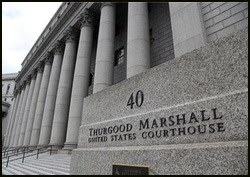
Two amicus curiae (friend of the court) briefs have been filed in support of Knife Rights’ Appeal in its federal civil rights lawsuit against New York City and District Attorney Cyrus Vance, Jr.
The first brief, filed by a group of 17 law professors led by Yale law professor Gideon Yaffe, highlights how the gravity knife law is even more problematic under the Constitution because it does not require the state to prove that a person knows a knife is illegal for that person to be subject to arrest and prosecution.
While our Plaintiffs argue that the DA’s and City’s enforcement approach makes it impossible for a person to figure out if a knife might be considered a gravity knife, so they can protect themselves from arrest and prosecution, these amici go a step further and argue that our traditions of Due Process typically require for criminal laws such as this one that the state prove that a person knows he possesses an illegal object. The failure of New York law to require such proof of what is known as mens rea makes the vagueness and lack of notice all that much more suspect under our Constitution. This excellent brief was written pro bono by attorney Douglas M. Garrou, a partner at Hunton & Williams LLP in Richmond, Virginia.
Click to read the Law Professors’ amicus brief.
The second brief, filed by the Legal Aid Society, advances two arguments. First, the defendants’ failure to consistently arrest and prosecute retailers for possessing and selling putative gravity knives exacerbates the vagueness problem created by the Wrist-Flick Test. No reasonable person has adequate notice of the law when the NYPD treats an item as a tool on a store shelf, but an illegal weapon once purchased and they walk out the door with it. Second, the defendants treat the gravity knife statute as a modern-day vagrancy law, abusing it to sort and punish those people they deem undesirable, not individuals who have committed a clear violation of a precise code.

